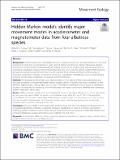Files in this item
Hidden Markov models identify major movement modes in accelerometer and magnetometer data from four albatross species
Item metadata
| dc.contributor.author | Conners, Melinda G. | |
| dc.contributor.author | Michelot, Théo | |
| dc.contributor.author | Heywood, Eleanor I. | |
| dc.contributor.author | Orben, Rachael A. | |
| dc.contributor.author | Phillips, Richard A. | |
| dc.contributor.author | Vyssotski, Alexei L. | |
| dc.contributor.author | Shaffer, Scott A. | |
| dc.contributor.author | Thorne, Lesley H. | |
| dc.date.accessioned | 2021-02-25T11:30:06Z | |
| dc.date.available | 2021-02-25T11:30:06Z | |
| dc.date.issued | 2021-02-22 | |
| dc.identifier | 273020513 | |
| dc.identifier | 9fc17b88-8d94-4eba-bee8-a5a0a9ffae1b | |
| dc.identifier | 85101373640 | |
| dc.identifier | 000620596800001 | |
| dc.identifier.citation | Conners , M G , Michelot , T , Heywood , E I , Orben , R A , Phillips , R A , Vyssotski , A L , Shaffer , S A & Thorne , L H 2021 , ' Hidden Markov models identify major movement modes in accelerometer and magnetometer data from four albatross species ' , Movement Ecology , vol. 9 , 7 . https://doi.org/10.1186/s40462-021-00243-z | en |
| dc.identifier.issn | 2051-3933 | |
| dc.identifier.other | Jisc: 95f2b936ab524038a25ad5657433d152 | |
| dc.identifier.other | publisher-id: s40462-021-00243-z | |
| dc.identifier.other | manuscript: 243 | |
| dc.identifier.uri | https://hdl.handle.net/10023/21507 | |
| dc.description | Funding: Funding was provided by an NSF CAREER award to L. Thorne under award number 79804, and by a Minghua Zhang Early Career Faculty Innovation award to L Thorne. | en |
| dc.description.abstract | Background Inertial measurement units (IMUs) with high-resolution sensors such as accelerometers are now used extensively to study fine-scale behavior in a wide range of marine and terrestrial animals. Robust and practical methods are required for the computationally-demanding analysis of the resulting large datasets, particularly for automating classification routines that construct behavioral time series and time-activity budgets. Magnetometers are used increasingly to study behavior, but it is not clear how these sensors contribute to the accuracy of behavioral classification methods. Development of effective classification methodology is key to understanding energetic and life-history implications of foraging and other behaviors. Methods We deployed accelerometers and magnetometers on four species of free-ranging albatrosses and evaluated the ability of unsupervised hidden Markov models (HMMs) to identify three major modalities in their behavior: ‘flapping flight’, ‘soaring flight’, and ‘on-water’. The relative contribution of each sensor to classification accuracy was measured by comparing HMM-inferred states with expert classifications identified from stereotypic patterns observed in sensor data. Results HMMs provided a flexible and easily interpretable means of classifying behavior from sensor data. Model accuracy was high overall (92%), but varied across behavioral states (87.6, 93.1 and 91.7% for ‘flapping flight’, ‘soaring flight’ and ‘on-water’, respectively). Models built on accelerometer data alone were as accurate as those that also included magnetometer data; however, the latter were useful for investigating slow and periodic behaviors such as dynamic soaring at a fine scale. Conclusions The use of IMUs in behavioral studies produces large data sets, necessitating the development of computationally-efficient methods to automate behavioral classification in order to synthesize and interpret underlying patterns. HMMs provide an accessible and robust framework for analyzing complex IMU datasets and comparing behavioral variation among taxa across habitats, time and space. | |
| dc.format.extent | 16 | |
| dc.format.extent | 4296283 | |
| dc.language.iso | eng | |
| dc.relation.ispartof | Movement Ecology | en |
| dc.subject | Research | en |
| dc.subject | Accelerometer | en |
| dc.subject | Albatross | en |
| dc.subject | Animal movement | en |
| dc.subject | Behavioral classification | en |
| dc.subject | Dynamic soaring | en |
| dc.subject | Hidden Markov models | en |
| dc.subject | Inertial measurement unit | en |
| dc.subject | Magnetometer | en |
| dc.subject | QL Zoology | en |
| dc.subject | QA Mathematics | en |
| dc.subject | DAS | en |
| dc.subject | SDG 14 - Life Below Water | en |
| dc.subject | MCC | en |
| dc.subject.lcc | QL | en |
| dc.subject.lcc | QA | en |
| dc.title | Hidden Markov models identify major movement modes in accelerometer and magnetometer data from four albatross species | en |
| dc.type | Journal article | en |
| dc.contributor.institution | University of St Andrews. Centre for Research into Ecological & Environmental Modelling | en |
| dc.contributor.institution | University of St Andrews. Statistics | en |
| dc.identifier.doi | 10.1186/s40462-021-00243-z | |
| dc.description.status | Peer reviewed | en |
This item appears in the following Collection(s)
Items in the St Andrews Research Repository are protected by copyright, with all rights reserved, unless otherwise indicated.

